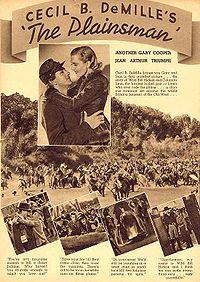
THE PLAINSMAN
US, 1936, 113 minutes, Black and white.
Gary Cooper, Jean Arthur, Charles Bickford.
Directed by Cecil B. de Mille.
The Plainsman is Cecil B. DeMille's big western of the mid thirties. Long in running-time and broad in scope, it has Gary Cooper in one of his efficient effective roles as Wild Bill Hickock. Jean Arthur is effective as Calamity Jane. The scope is wide and all done in the De Mille spectacular style.
l. A Cecil B. de Mille classic Western? The quality of the film's entertainment and interest value? A portrait of the American heritage? The legendary aspects of the American heritage?
2. The qualities of the film from the thirties, the black and white photography, studio and location photography, the scope of the screenplay and its presentation?
3. The emphases on the American heritage: the opening with Lincoln, Horace Greeley and the opening up of the West, Bill Cody as a scout, Wild Bill Hickock as a plainsman and gunfighter, Custer and the Army? The range of the American heritage of the West, the facts of these particular individuals, the way that they were changed for the film, the ingredients of a legend?
4. The vision of Lincoln at the opening of the film: the Civil War, the vision of the West, making the West, the settling of the plains? The machinations of his advisors, the men with the power and the guns wanting their money? Exploiting the Indians? The irony of Lincoln's assassination in this context?
5. The outdoor portrayal of the 19th century: the steam boat, ways of travel, the towns, the rivers, the coaches, the cargo, passengers, gambling on the boats etc.? The colourful picture of the period?
6. The film's introduction of Bill Hickock via the conversation with the boy? Talk of the shooting, guns, the watch with Calamity Jane? The personality of Hickock? His role in the war? The introduction to Cody and his wife and the memories of his past? The introduction to Calamity Jane on the arrival in the town and her work with the coach? The irony of the vision of the West, work in the West, marriage and settling down, the future?
7. The portrayal of Latimer as a villain, his role in the Indian wars and the selling of guns, the greed of the white men, the effect on the Indians and their going on the warpath? The portrayal of the Indians in camp, torturing Hickock and Jane? The siege? Little Big Horn? So many deaths? The film's judgment on the gun sellers?
8. How sympathetic or fair the picture of the Indians: Yellow Hand, language. the Indians with Mrs Cody and Jane, the capture of Jane, the torture of Hickock? The siege, the defeat of Custer, the buying of the guns? The hostile language against the Indians reflecting the Plainsman times?
9. The portrayal of Buffalo Bill and people's expectations, his past reputation, his wife and their plans of settling down, his motivation to act as a scout, his role in the siege and being wounded, his being forced to arrest Hickock, his coming in at the end at Hickock's death? The character sketch of the legendary Cody?
10. The contrast with Wild Bill Hickock as hero: Gary Cooper's style, portraying the legend, a gunfighter and a killer, the importance of his talk with the boy, his attitude towards marriage and Jane, his suspicion of the guns, his going alone to scout out Yellow Hand, torture and his reaction to Jane's telling the Indians the route, his participation in the siege, the shooting of Latimer's soldiers, hiding and surviving in the West, the encounter with Cody, the Indian telling the story of Little Big Horn, his helping and the card game, the irony of his being shot in the back? A legendary man with a legendary death? How good a characterization, portrait?
11. Calamity Jane and the tradition in the West, her role in the West with coaches, crime, helping Mrs Cody in the sequence with the dress, being captured, loving Hickock, being tortured and telling the truth? The pathos of her presence at Hickock's death?
12. The continual presence of Mc Call during the film, his shortness, wanting to be a friend of Hickock, spying for Latimer, the irony of his shooting Hickock in the back?
13. The cowboy and Indians themes? Themes of the American West? Exploiting and exploring? The tradition of America and American cinema?